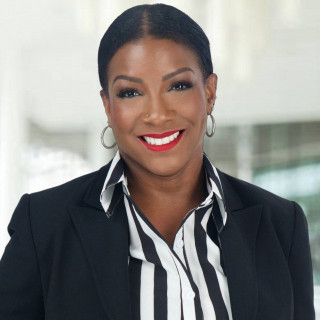Atlanta Lawyers
Find Atlanta Lawyers by Practice Area
![Meg Strickler Meg Strickler]()
Claimed Lawyer ProfileOffers Video ConferencingQ&ALII GoldBlawg Search
Meg Strickler
Atlanta, GA Lawyer with 27 years of experience
Free ConsultationOffers Video ConferencingVideo ConfCriminal and White Collar Crime
Emory University School of Law
Meg Strickler, a criminal defense attorney with Conaway & Strickler, PC, in Atlanta, Georgia, has earned an international reputation for her knowledge and experience in Internet crime and technology law.
Ms. Strickler represents clients in these cutting-edge cases as well as those involving more traditional white collar crimes, such as tax evasion, money laundering, racketeering, international extradition and fraud.
![George Chadwell Creal Jr. George Chadwell Creal Jr.]()
Claimed Lawyer ProfileOffers Video ConferencingQ&ALII GoldBlawg Search
George Chadwell Creal Jr.
10.0  (3 Peer Reviews)
(3 Peer Reviews)
(404) 333-0706
480 John Wesley Dobbs Ave. NE
Unit 190
Atlanta, GA 30312
Free ConsultationOffers Video ConferencingVideo ConfAtlanta, GA Attorney with 31 years of experience
Criminal, DUI, Personal Injury and Workers' Comp
The University of Georgia School of Law and University System of Georgia - University of Georgia
George C. Creal, Jr., P.C. is a law firm concentrating in DUI Defense and Personal Injury and Work Injury Prosecution. We have represented thousands of individuals arrested for DUI, secured over 100 not guilty jury verdicts for our clients and secured millions of dollars in settlements and judgments for those injured at work and through the negligence of others. As reflected in our 5 star client reviews across the internet, our dedication to customer service and the well-being of our clients are second to none. Rated AV Preeminent on Martindale.com and 10.0/10.0 on Avvo.com. If you are in Metro Atlanta...
![Charles Scholle Charles Scholle]()
Claimed Lawyer ProfileOffers Video ConferencingQ&ABlawg SearchSocial Media
Charles Scholle
10.0  (1 Peer Review)
(1 Peer Review)
Free ConsultationOffers Video ConferencingVideo ConfAtlanta, GA Attorney with 29 years of experience
Medical Malpractice, Personal Injury and Products Liability
University of Georgia School of Law
As the founding partner at Scholle Law, Charles Scholle has practiced law in the Atlanta metro area and throughout Georgia, for nearly three decades. He has recovered millions of dollars for his clients. He has also earned the highest preeminent ratings from his peers for both excellence in legal practice and ethical standards. Scholle Law is dedicated to injury practice areas including, serious personal injury, traumatic brain injury, wrongful death and motor vehicle accidents. We have a reputation for excellence and dedication to our clients which is backed up by their reviews of their experience with our firm.
We approach...
![W. Calvin Bomar W. Calvin Bomar]()
Claimed Lawyer ProfileQ&ALII GoldSocial Media
W. Calvin Bomar
10.0  (1 Peer Review)
(1 Peer Review)
Free ConsultationAtlanta, GA Lawyer with 24 years of experience
Tax
New York University School of Law and Cumberland School of Law, Samford University
I am a former IRS Office of Chief Counsel attorney who has extensive experience helping clients with IRS audit, Tax Court litigation and syndicated conservation easement cases.
I received my law degree in 2000 from Samford University, and my LL.M. in Tax Law from New York University in 2001.
After that, I worked in Washington, D.C. for the IRS Office of Chief Counsel. After leaving IRS, I worked at a large law firm for 4 years, and then opened Bomar Law Firm in Atlanta, Georgia in 2007.
Prior to graduating law school, I clerked in...
![Regina Irene Edwards Regina Irene Edwards]()
Claimed Lawyer ProfileOffers Video ConferencingQ&ALII GoldSocial Media
Regina Irene Edwards
9.9  (7 Peer Reviews)
(7 Peer Reviews)
Free ConsultationOffers Video ConferencingVideo ConfAtlanta, GA Attorney with 24 years of experience
Bankruptcy and Personal Injury
Tulane University School of Law
I am currently accepting divorce cases and handling auto accident and personal bankruptcy cases statewide. My firm is recognized for our aggressive representation, meticulous preparation, and fair, flat fees. As a potential client, you can be confident in my extensive experience and dedication to your case, ensuring that you receive the personal attention your case demands. With over 24 years of practice, I am well-regarded by both opposing attorneys and judges.
Please be aware that I do not handle family law cases involving DFCS.
I maintain a very low caseload, which allows me to handle only one trial matter at a time....
![Onyema Anene Farrey Onyema Anene Farrey]()
Claimed Lawyer ProfileOffers Video ConferencingQ&ALII GoldSocial Media
Onyema Anene Farrey
Atlanta, GA Attorney with 15 years of experience
Free ConsultationOffers Video ConferencingVideo ConfDivorce and Family
Stetson University College of Law
Our areas of practice ranges from prenuptial agreements and child support matters to complex custody battles, and high-asset divorces. We are well-known and respected in the legal community as highly intellectual and skilled attorneys, and quickly gained a reputation of being known as fearless litigators because of our track record!
We developed a niche area of of the law that focuses on Father’s Rights. Although we represent both men and women, we discovered that there was a need for Fathers to have more legal representation in the courtroom as they are traditionally the "underdogs" when fighting for custody. So it...
![Mr. Robert Neal Katz Mr. Robert Neal Katz]()
Claimed Lawyer ProfileOffers Video ConferencingQ&ALII GoldBlawg Search
Mr. Robert Neal Katz
10.0  (2 Peer Reviews)
(2 Peer Reviews)
Free ConsultationOffers Video ConferencingVideo ConfAtlanta, GA Attorney with 38 years of experience
Insurance Claims, Medical Malpractice, Nursing Home and Personal Injury
The University of Georgia School of Law and The University of Georgia School of Law
Robert Katz received his B.B.A. and Juris Doctor (Cum Laude) from the University of Georgia. He completed judicial clerkships in the Georgia Court of Appeals and the Superior Court of DeKalb County prior to entering private practice, and founding Katz Personal Injury Lawyers in 1994, where he is focuses on representing individuals in personal injury cases.
![Casey W. Stevens Casey W. Stevens]()
Claimed Lawyer ProfileOffers Video ConferencingQ&ALII GoldSocial Media
Casey W. Stevens
10.0  (1 Peer Review)
(1 Peer Review)
Free ConsultationOffers Video ConferencingVideo ConfAtlanta, GA Attorney with 26 years of experience
Insurance Claims, Personal Injury, Products Liability and Workers' Comp
Georgia State University College of Law
Casey W. Stevens worked in the insurance claims management business full time while attending Georgia State College of Law. Upon graduation in 1998, Attorney Stevens went to work for a large Atlanta insurance defense firm. In 2001, he started his own plaintiff's firm, representing the injured. Mr. Stevens has handled hundreds of injury cases, resulting in millions of dollars of settlements for his clients.
Casey Stevens handles ONLY personal injury cases that result from someone else's negligence. Our firm specializes in accident law, including automobiles, trucks, motorcycles, pedestrians, bicycles, ATV's, boats, small watercraft, and golf carts. ...
![Hassan Hussein Elkhalil Hassan Hussein Elkhalil]()
Claimed Lawyer ProfileOffers Video ConferencingQ&ASocial MediaResponsive Law
Hassan Hussein Elkhalil
10.0  (1 Peer Review)
(1 Peer Review)
Offers Video ConferencingVideo ConfAtlanta, GA Attorney with 22 years of experience
Business, Immigration and International
John Marshall L.S. (Atlanta)
Born in Beirut, Lebanon. Attended the University of Tennessee in Knoxville, where he received his Bachelor of Arts in Political Science. He then went on to receive his J.D. from John Marshall Law School, and an LL.M. in Dispute Resolution from the University of Missouri – Columbia Law School. Additionally, Mr. Elkhalil is a member of the American Bar Association and the American Immigration Lawyers Association. Fluent in Arabic, Mr. Elkhalil is extremely active in his community and participates in a variety of community, cultural, and civil rights organizations.
![Ellaretha Coleman Ellaretha Coleman]()
Claimed Lawyer ProfileOffers Video ConferencingQ&ALII GoldSocial Media
Ellaretha Coleman
10.0  (8 Peer Reviews)
(8 Peer Reviews)
Offers Video ConferencingVideo ConfAtlanta, GA Lawyer with 19 years of experience
Divorce, Domestic Violence, Family and Insurance Claims
Howard University School of Law
Ellaretha Coleman is an accomplished litigation attorney with experience defending the rights and best interests of individuals throughout the Atlanta-metropolitan area, as well as the state of Florida.
Ms. Coleman has substantial experience in the areas of Family Law, Divorce Law, and Custody.
Ms. Coleman has been widely applauded by both clients and peers for her written and oral advocacy skills, but it is her genuine and personable approach towards client relationships which has most distinguished her. A talented and business-savvy entrepreneur, Ms. Coleman continues to diversify her practice to ensure the fulfillment of every client's needs. Ms. Coleman...
![Alexander D. Weatherby Alexander D. Weatherby]()
Claimed Lawyer ProfileOffers Video ConferencingQ&ASocial Media
Alexander D. Weatherby
10.0  (1 Peer Review)
(1 Peer Review)
Free ConsultationOffers Video ConferencingVideo ConfAtlanta, GA Lawyer with 14 years of experience
Personal Injury
University System of Georgia - University of Georgia
Alex knows first-hand what it means to have suffered great loss, and he has in turn dedicated his life to helping injured clients get the compensation they deserve. Alex is an award-winning personal injury trial lawyer. He has achieved a record setting verdict and regularly teaches other lawyers about maximizing their cases.
Focus Areas of Practice
• Trucking Collisions –Represented one of the largest trucking companies in the world for 12 years. Handled numerous trucking cases, on plaintiff and defense sides.
• Wrongful Death – Received one of the top 10 wrongful death verdicts in the country in 2018. Have recovered...
![William C. Head William C. Head]()
Claimed Lawyer ProfileOffers Video ConferencingQ&ASocial Media
William C. Head
10.0  (3 Peer Reviews)
(3 Peer Reviews)
Free ConsultationOffers Video ConferencingVideo ConfAtlanta, GA Lawyer with 48 years of experience
Criminal, DUI, Domestic Violence and Traffic Tickets
University System of Georgia - University of Georgia
I graduated from the University of Georgia in 1973 with honors and continued my education at the UGA School of Law, completing my degree in 1976. I am a co-author of Georgia's leading DUI legal book and have a practice focused on DUI defense litigation. I have received top ratings from Martindale, Best Lawyers, Super Lawyers, and Best Law Firms in America.
Since 1978, I have chaired or co-chaired over 40 legal seminars for the Institute of Continuing Legal Education in Georgia (ICLE-GA). In 1991, I co-authored "101 Ways to Avoid a Drunk Driving Conviction" with Reese I. Joye, Jr. Starting...
![Ken Shigley Ken Shigley]()
Claimed Lawyer ProfileOffers Video ConferencingQ&ALII GoldBlawg Search
Ken Shigley
10.0  (2 Peer Reviews)
(2 Peer Reviews)
Free ConsultationOffers Video ConferencingVideo ConfAtlanta, GA Lawyer with 47 years of experience
Personal Injury and Products Liability
Emory University School of Law
Ken Shigley is:
- The first Georgia lawyer to earn three national board certification in his practice area (Truck Accident Law, Civil Trial Advocacy & Civil Pretrial Advocacy) from the National Board of Trial Advocacy
- Recipient of Traditions of Excellence Award for lifetime achievement
- Past President, State Bar of Georgia
- Author of 11 editions of a book on trial preparation in injury cases
He has been an attorney in cases racking up total recoveries of $22 million in 2019 alone.
![Walter Gabriel Walter Gabriel]()
Claimed Lawyer ProfileOffers Video ConferencingQ&ASocial MediaResponsive Law
Walter Gabriel
Atlanta, GA Lawyer with 15 years of experience
Free ConsultationOffers Video ConferencingVideo ConfPersonal Injury
Southern University Law Center
Our firm specializes in taking the stress and worry away from our clients. When clients sign up with our firm, they can meet their medical appointments and eventually get back to their lives knowing that we will take care of them.
Attorney Walter Gabriel has recently been selected Top 40 Under 40 by the National Trial Lawyers Association and is peer-rated AV Preeminent for highest level of professional excellence. Millions of dollars have been recovered for clients of the Law Firm of Walter Gabriel.
![Katherine Lee McArthur Katherine Lee McArthur]()
Claimed Lawyer ProfileOffers Video ConferencingQ&ASocial Media
Katherine Lee McArthur
10.0  (1 Peer Review)
(1 Peer Review)
Free ConsultationOffers Video ConferencingVideo ConfAtlanta, GA Attorney with 45 years of experience
Medical Malpractice, Nursing Home, Personal Injury and Products Liability
University of North Carolina School of Law
Kathy McArthur is a top-rated personal injury attorney, trucking accident attorney, and medical malpractice attorney near me & has obtained multiple successful MULTI-million dollar recoveries for clients.
Her firm ONLY handles SERIOUS bodily injury cases, wrongful death claims, medical misdiagnosis in GA and other states. The Firm limits its INJURY cases to: wrongful death cases, serious bodily injuries, like scarring, burn injuries, dislocated or broken bones, blindness, loss of hearing, organic brain damage, spinal cord injury or neck fracture.
Very substantial awards have also been obtained by her law firm (at trials or being settled just before trial...
![Cory Yager Cory Yager]()
Claimed Lawyer ProfileQ&ASocial Media
Cory Yager
10.0  (1 Peer Review)
(1 Peer Review)
Free ConsultationAtlanta, GA Lawyer with 17 years of experience
Criminal, DUI, Domestic Violence and Immigration
Atlanta's John Marshall Law School
Graduated second in his class at Atlanta's John Marshall Law School while working full time as a police officer. Highly effective in litigation and trials. Handled over 1500 criminal cases, felony or misdemeanor. Criminal cases involving alcohol or drugs are 85% of all criminal cases, with personal injury for the remainder. Martindale-Hubbell "av" and Preeminent Rated for several years. Super Lawyers-9 years, as Rising Star or Super Lawyer.
![Larry Kohn Larry Kohn]()
Claimed Lawyer ProfileQ&ASocial Media
Larry Kohn
10.0  (1 Peer Review)
(1 Peer Review)
Free ConsultationAtlanta, GA Lawyer with 26 years of experience
Criminal, DUI, Domestic Violence and Traffic Tickets
Georgia State University College of Law
Best Lawyers in America for DUI Defense, 2018 and 2019. Super Lawyers Top-Rated DUI, Criminal Defense & Personal Injury Attorney. Emory Undergraduate Degree, and Georgia State Law School Juris Doctor degree, high honors, in 1998. Extensive experience with the top DUI lawyer in America, Bubba Head. If arrested for DUI in Georgia, our Atlanta DUI lawyers can assist you. Regular seminar speaker on DUI-DWI. NHTSA DUI standardized field sobriety test instructor. Trained on GA DUI test machine, Intoxilyzer 9000. Legal book author on DUI law and probable cause to arrest for DUI. Partner and DUI attorney Cory Yager is an...
![Joseph Aaron Fried Joseph Aaron Fried]()
Claimed Lawyer ProfileOffers Video ConferencingSocial Media
Joseph Aaron Fried
10.0  (1 Peer Review)
(1 Peer Review)
Offers Video ConferencingVideo ConfAtlanta, GA Attorney with 31 years of experience
Personal Injury
The University of Georgia School of Law
Joe Fried is among the top truck crash lawyers in the United States. Based out of Atlanta, Georiga, he has handled cases in over 35 States with recoveries over $1 billion. He is the founder of the Academy of Truck Accident Attorneys, past Chair do the American Association of Justice Trucking Litigation Group, and past President of the National Trial Attorneys Trucking Trial Lawyers. Joe has authored books, DVDs, and peer-reviewed articles on handling commercial motor vehicle cases and has given over 600 presentations to lawyer, judge, and law enforcement audiences on commercial vehicle-related subjects as well...
![T. Andrew Miller T. Andrew Miller]()
Claimed Lawyer ProfileOffers Video ConferencingQ&ALII GoldBlawg Search
T. Andrew Miller
Atlanta, GA Attorney with 18 years of experience
Free ConsultationOffers Video ConferencingVideo ConfPersonal Injury and Workers' Comp
Mercer University Walter F. George School of Law
The Law Offices of T. Andrew Miller LLC, in Atlanta, GA, focuses on getting injured workers the right compensation for their work-related injury. The firm provides high-quality representation for all clients. The firm prides itself on being innovative and efficient when representing clients. Attorney Andrew Miller used to work for insurance companies and employers, gaining significant trial experience. Today, he uses that knowledge and experience to uphold the rights of injured workers and their families. He represents employees statewide who have suffered catastrophic and disabling injuries rendering them unable to earn a living. He understands how this lack of...
![Karen Weinstock Karen Weinstock]()
Claimed Lawyer ProfileQ&ASocial Media
Karen Weinstock
Atlanta, GA Attorney with 26 years of experience
Immigration
The Hebrew University
Karen Weinstock is the managing attorney of Weinstock Immigration Lawyers, the premier immigration law firm in Atlanta, Georgia. With over 19 years of experience, she has developed expertise representing U.S. and international companies in securing global talent and ensuring the employees and their families have a good experience in immigrating to the United States.
Karen was born and raised in Israel and immigrated to the United States in 2000. Her genuine passion for immigration law is a direct result of her personal experience as an immigrant. This ability to identify and empathize with immigrants, and her commitment to excellence in...
![E. Jay Abt E. Jay Abt]()
Claimed Lawyer ProfileOffers Video ConferencingQ&ASocial Media
E. Jay Abt
Atlanta, GA Attorney with 29 years of experience
Free ConsultationOffers Video ConferencingVideo ConfCriminal, Domestic Violence and White Collar Crime
Emory University School of Law
E. Jay Abt is a trial-oriented criminal defense attorney who understands that his clients are facing one of the most challenging moments of their life. Mr. Abt defends those who are facing serious charges with skilled and aggressive defense tactics. After studying Japanese history at Emory University, E. Jay Abt graduated with his Bachelor of Arts in 1992. He then continued his education at Emory Law School and graduated in 1995. In 2000, Mr. Abt Founded Abt Law Firm, LLC in Atlanta, Georgia on the principle that all who face criminal charges deserve a fighting chance in court. For the...
![Tia L. Smith Tia L. Smith]()
Claimed Lawyer ProfileOffers Video ConferencingQ&ALII GoldSocial Media
Tia L. Smith
Atlanta, GA Attorney with 14 years of experience
Offers Video ConferencingVideo ConfEstate Planning and Immigration
University System of Georgia - University of Georgia
Tia Smith Law specializes in providing tailored solutions for families and employers seeking assistance with immigration and estate planning needs.
Tia Smith Law has been recognized as a firm that provides outstanding service with a personalize touch for individuals, families, and professionals. Our clients understand the value of having solid legal representation on your side, while navigating complex immigration and naturalization laws.
![Sabrina A. Parker Sabrina A. Parker]()
Claimed Lawyer ProfileOffers Video ConferencingQ&ALII GoldSocial Media
Sabrina A. Parker
Atlanta, GA Attorney with 28 years of experience
Free ConsultationOffers Video ConferencingVideo ConfBankruptcy
Atlanta's John Marshall Law School
Sabrina A. Parker has a 28-year track record of success as a bankruptcy attorney having completed over 10,000 bankruptcy cases as well as helping families avoid bankruptcy through other debt relief solutions. Sabrina has stopped creditor harassment and halted wage and bank garnishments for her clients.
She truly cares about securing the best outcome for her clients. Sabrina is willing and able to fight for her clients' rights and has successfully extended that fight to the appellate courts when necessary.
For individuals, families and small business owners struggling with heavy debt burdens, Chapter 7 bankruptcy can be the quickest and most effective...
![JJ Poole JJ Poole]()
Claimed Lawyer ProfileOffers Video ConferencingQ&ALII GoldSocial Media
JJ Poole
Atlanta, GA Attorney
Free ConsultationOffers Video ConferencingVideo ConfBusiness, Entertainment & Sports, IP and Real Estate
Atlanta's John Marshall Law School
JJ Poole is the owner of JJ Poole Attorney at Law, LLC and an Associate Closing Attorney that works with Elite Law. He specializes in Sports and Entertainment Contracts, Civil Litigation, Intellectual and Real Property law, and is a certified Agent for the NFL and NBA player associations.
Attorney Poole is an alumni of the University of Georgia and Atlanta’s John Marshall Law School. He is also a licensed five-star rated residential and commercial real estate broker, and graduate of the Atlanta Realtors Association Leadership and Development Program. His designations include Certified Foreign Investor Specialist, as well as Certified...
![Robert J. Fleming Robert J. Fleming]()
Claimed Lawyer ProfileOffers Video ConferencingQ&ALII GoldBlawg Search
Robert J. Fleming
10.0  (1 Peer Review)
(1 Peer Review)
Free ConsultationOffers Video ConferencingVideo ConfAtlanta, GA Lawyer with 30 years of experience
Emory University School of Law
Rob Fleming is a partner in Katz & Fleming LLC. His practice is focused on medical malpractice, dental malpractice, serious personal injury and business litigation. With over 25 years of experience, he has had great success in the courtroom. He has achieved numerous multi-million dollar recoveries for his clients and has several very large verdicts.
After starting his legal career defending doctors and large hospitals, Mr. Fleming now exclusively represents Plaintiffs who have been injured by the negligence of medical professionals such as doctors and dentists. He also specializes in handling commission cases and represents employees who have earned commissions...
![Gregory R. Fidlon Gregory R. Fidlon]()
Claimed Lawyer ProfileLII GoldSocial Media
Gregory R. Fidlon
Atlanta, GA Attorney with 26 years of experience
Free ConsultationEmployment
University of Pennsylvania
I focus on labor and employment law and assist clients in metro Atlanta and throughout the state of Georgia. I earned my law degree from the University of Pennsylvania Law School in 1998 and have since dedicated my practice solely to labor and employment law. Throughout my career, I have worked with prestigious law firms and represented a diverse range of clients, from Fortune 100 companies to individual employees. I take pride in resolving clients' legal issues efficiently and cost-effectively.
I provide representation and advice on all facets of the employment relationship. This includes handling discrimination claims under Title VII of...
![Jeb Butler Jeb Butler]()
Claimed Lawyer ProfileQ&ASocial Media
Jeb Butler
10.0  (2 Peer Reviews)
(2 Peer Reviews)
Free ConsultationAtlanta, GA Attorney with 16 years of experience
Personal Injury
University System of Georgia - University of Georgia
We handle serious personal injury and wrongful death cases. We take only a small number of cases so that we can provide exceptional services to the clients we take on. Our results include a jury verdict of $150 million.
We don't work like most personal injury firms. We believe in doing the hard work--calling and tracking down witnesses, digging through boxes of old files, and connecting with our clients to understand what happened and how it has affected them. We believe in attention to detail.
You'll never see our firm on a billboard or a daytime television ad....
![Graham Scofield Graham Scofield]()
Claimed Lawyer ProfileOffers Video ConferencingQ&ASocial Media
Graham Scofield
Atlanta, GA Attorney with 15 years of experience
(404) 939-9470
691 John Wesley Dobbs Avenue NE
Suite C-04
Atlanta, GA 30321
Free ConsultationOffers Video ConferencingVideo ConfLegal Malpractice, Medical Malpractice, Personal Injury and Products Liability
Emory University School of Law
I strive to level the playing field for his clients. That way, my clients receive the same skilled representation as the powerful individuals, corporations, and employers that harmed them.
I am a former defense lawyer. Therefore, I know how the other side evaluates personal injury cases and employment disputes. I'll use that knowledge and experience to help you win a great result. Just ask my colleagues and former clients.
I treat my clients like they’re my family. That means I give every case the same degree of care that it would receive if it involved a member of my household. Additionally, I...
![Jim Yeargan Jim Yeargan]()
Claimed Lawyer ProfileOffers Video ConferencingLII GoldSocial Media
Jim Yeargan
10.0  (1 Peer Review)
(1 Peer Review)
(404) 467-1747
3715 Northside Parkway
Building 100, Suite 500
Atlanta, GA 30327
Free ConsultationOffers Video ConferencingVideo ConfAtlanta, GA Attorney with 21 years of experience
Criminal, DUI and Traffic Tickets
Mercer University Walter F. George School of Law
James Yeargan is one of the most respected, and sought after DUI attorneys in the state. His successful defense record, and unprecedented devotion to his clients, has earned him this honor. Mr. Yeargan’s reputation as a tenacious DUI practitioner, coupled with his remarkable trial strategy and indomitable presence in the courtroom, have earned him the moniker “DUI Jim” throughout the Atlanta community, and Georgia at large. It is his dedication to his clients that makes Mr. Yeargan’s DUI practice so unique and sought after.
![Jonathan Avi Barash Jonathan Avi Barash]()
Claimed Lawyer ProfileOffers Video ConferencingQ&ASocial Media
Jonathan Avi Barash
10.0  (1 Peer Review)
(1 Peer Review)
Free ConsultationOffers Video ConferencingVideo ConfAtlanta, GA Attorney with 28 years of experience
Business, Collections, Construction and Real Estate
University of Florida Levin College of Law
Jon Barash offers his clients over twenty years of experience practicing a broad range of commercial litigation issues, including business litigation, construction litigation, contract disputes, real estate disputes, restrictive covenants, and covenants not to compete litigation, shareholder and partnership disputes, business torts, business divorces, and commercial collections. He has considerable experience assisting businesses, state and local governments, and individual clients in litigation, mediations, and arbitrations in both state and federal courts, and pre-suit when possible.
Jon has achieved an AV® Preeminent Peer Review Rating, the highest rating awarded for legal ability and ethical standards, from Martindale-Hubbell. He is also among a...
![Robin Frazer Clark Robin Frazer Clark]()
Claimed Lawyer ProfileOffers Video ConferencingLII GoldBlawg SearchSocial Media
Robin Frazer Clark
Atlanta, GA Lawyer with 37 years of experience
Free ConsultationOffers Video ConferencingVideo ConfInsurance Claims, Medical Malpractice, Personal Injury and Products Liability
Emory University School of Law
ROBIN FRAZER CLARK
Robin Frazer Clark is the owner and founder of the law firm of Robin Frazer Clark, P.C., and has practiced law in Georgia for 31 years. Ms. Clark devotes her practice exclusively to plaintiff’s personal injury. Her motto is “A Rising Tide Lifts All Boats.”
Ms. Clark was sworn in as the Fiftieth President of the State Bar of Georgia on June 2, 2012, only the second woman ever to serve as President of the State Bar of Georgia and served as President of the 45,000-member association in 2012-2013. One of Ms. Clark’s initiatives she created...
![Laura Cunard Reis Laura Cunard Reis]()
Claimed Lawyer ProfileSocial MediaResponsive Law
Laura Cunard Reis
Atlanta, GA Lawyer with 21 years of experience
Free ConsultationPersonal Injury and Workers' Comp
Emory University School of Law
Laura Reis is the founder of ReisLaw, LLC where she has directed her practice to the representation of Georgia’s injury victims for over a decade.
She is dedicated to providing you with professional, experienced and aggressive representation. This is a difficult time in your life and filing a workers’ compensation claim can be a complicated and slow process without a results-oriented lawyer working for you.
Laura Reis has dedicated her practice to the representation of injured workers since 2003. In the past Fifteen Years, Laura has resolved thousands of workers’ compensation claims through trial or settlement and procures millions of dollars for...
![Ted Sink Ted Sink]()
Claimed Lawyer ProfileOffers Video ConferencingQ&ASocial Media
Ted Sink
Atlanta, GA Attorney with 9 years of experience
Free ConsultationOffers Video ConferencingVideo ConfPersonal Injury
Charleston School of Law
Attorney Ted Sink has been recognized on NBC, ABC, CBS, Fox, USA Today, Forbes, Entrepreneur, The Atlanta Journal-Constitution, Post & Courier, The State Newspaper (SC), Greenville Business Magazine, American Bar Association Journal, Associated Press and more. Ted has won the Clients’ Choice Award from Avvo, where he is also ranked as a “Top Lawyer”, he has been named a finalist for “Best Personal Injury Lawyer” by readers of the Charleston City Paper and is a sought-after speaker for other lawyers and law firms
Ted was raised in a military family, growing up mainly in Georgia and South Carolina, along with his...
![Trace Brooks Trace Brooks]()
Claimed Lawyer ProfileOffers Video ConferencingQ&ASocial Media
Trace Brooks
Atlanta, GA Attorney with 8 years of experience
Offers Video ConferencingVideo ConfEstate Planning, Probate and Tax
University of Florida Levin College of Law and Georgia State University College of Law
Trace Brooks is the Founder and Managing Attorney of Trace Brooks Law, a Georgia law firm dedicated to providing exceptional client service. Trace Brooks Law limits the number of clients we work with to ensure we can meet the exceptional service standards we strive for. We understand that every client is unique, which is why our comprehensive legal solutions are tailored to their specific needs.
Comprehensive estate planning services are at the heart of Trace Brooks Law. Having witnessed the complications, costs, and stress caused by a lack of estate planning amongst family and friends, Trace founded Trace Brooks Law to...
![Ryan Locke Ryan Locke]()
Claimed Lawyer ProfileSocial MediaResponsive Law
Ryan Locke
Atlanta, GA Attorney with 14 years of experience
Free ConsultationAppeals, Criminal and Personal Injury
University System of Georgia - University of Georgia
Ryan Locke represents people who have been injured and people who have been unfairly convicted from his office in Atlanta. Formerly a public defender, Ryan uses the same passion and relentless advocacy for his clients today. Ryan is also an adjunct professor at Emory University School of Law; hosts a podcast about appellate practice called Georgia Appellate Review; and maintains comprehensive legal resources on his website for lawyers and the public, such as his guide for using the HITECH Act to get cheap medical records and his guide for people to change their name and gender in Georgia government documents.
![Saraliene Durrett Saraliene Durrett]()
Claimed Lawyer ProfileOffers Video ConferencingLII GoldSocial Media
Saraliene Durrett
10.0  (2 Peer Reviews)
(2 Peer Reviews)
Free ConsultationOffers Video ConferencingVideo ConfAtlanta, GA Lawyer with 17 years of experience
Appeals and Criminal
University of Kansas School of Law
Saraliene is a criminal defense attorney with over 15 years of experience fighting for her clients in state and federal court. She has argued many times before the federal and state appellate courts. She has appeared on Court TV as a criminal defense expert to discuss high profile cases.
Let her use her expertise to help you win your case.
![Michael E. Perez Michael E. Perez]()
Claimed Lawyer ProfileOffers Video ConferencingSocial Media
Michael E. Perez
Atlanta, GA Attorney with 23 years of experience
Free ConsultationOffers Video ConferencingVideo ConfMedical Malpractice, Personal Injury and Products Liability
University System of Georgia - University of Georgia
Throughout my legal career, I’ve represented families and individuals who have been hurt by other people, healthcare organizations or corporations. And as the child of immigrants who fled Cuba for a country that valued justice and equality for all, I have a strong appreciation for our system of justice and the Constitutional right to a trial by jury. Fighting for my clients’ rights is something I care deeply about, and it is my honor to represent those who feel that they are powerless against insurance companies, healthcare providers and big corporations.
At The Pérez Law Firm, we have experience getting justice...
![V. Joy Edwards V. Joy Edwards]()
Claimed Lawyer ProfileOffers Video ConferencingQ&ALII GoldSocial Media
V. Joy Edwards
10.0  (1 Peer Review)
(1 Peer Review)
Offers Video ConferencingVideo ConfAtlanta, GA Lawyer with 23 years of experience
Arbitration & Mediation, Divorce, Estate Planning and Family
Rutgers School of Law-Camden and Huntingdon College
Attorney Edwards is a well known experienced Atlanta divorce attorney and an excellent litigator. This means if your case calls for aggressive litigation skills, Ms Edwards is the perfect advocate for you.
Ms. Edwards spent three years as the Staff Attorney for two judges in the State Court of Cobb County. That experience has been invaluable in helping her hone her litigation skills and courtroom decorum. It is not often that you can find an attorney to represent you who has had experience from both sides of the bench.
After graduating from Law School, Ms. Edwards was employed at a firm...
![Eric Bernstein Eric Bernstein]()
Claimed Lawyer ProfileLII GoldBlawg SearchSocial Media
Eric Bernstein
10.0  (2 Peer Reviews)
(2 Peer Reviews)
(404) 333-0706
480 John Wesley Dobbs Ave NE
Unit 190
Atlanta, GA 30312
Free ConsultationAtlanta, GA Attorney with 17 years of experience
Criminal and DUI
University of Miami School of Law
After years of representing indigent clients in matters ranging from traffic crimes to murder as an Assistant Public Defender in Miami, Eric Bernstein has transitioned into private criminal defense in the Metro Atlanta area and well beyond. Trained for years by some of most respected criminal defense attorneys in the business, Mr. Bernstein incorporates his trial skills and negotiation techniques on a daily basis with George Creal Jr., P.C. He has helped clients obtain justice in dozens of counties and municipalities all over the state of Georgia. Mr. Bernstein has also tried cases ranging from murder to...
![Terri Herron Terri Herron]()
Claimed Lawyer ProfileOffers Video ConferencingQ&ASocial MediaResponsive Law
Terri Herron
10.0  (4 Peer Reviews)
(4 Peer Reviews)
Free ConsultationOffers Video ConferencingVideo ConfAtlanta, GA Lawyer with 16 years of experience
Divorce and Family
Texas Southern University Thurgood Marshall School of Law
At Terri Herron Law, we strive to do more than just practice family law in Georgia. We'll invest ourselves in your case by intently listening to your story. We'll work hard to give you the legal voice you need to get through this challenging time in your life. Our goal is to become the law firm that your family can turn to repeatedly for personalized and effective representation.
For all your family law needs - Contact Terri Herron today for a free consultation! (404) 418-7777
Lawyers in Nearby CitiesLawyers in Nearby Counties
Atlanta Legal Aid & Pro Bono Services
Georgia Lawyers for the Arts
(404) 873-3911
Atlanta, GA
Lambda Legal
(404) 897-1880
Atlanta, GA
Show More



















































